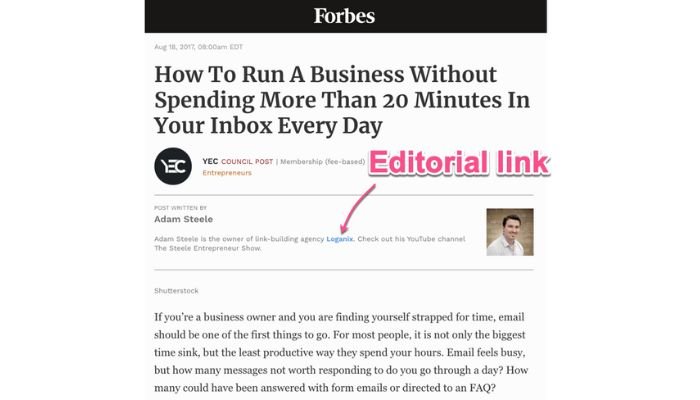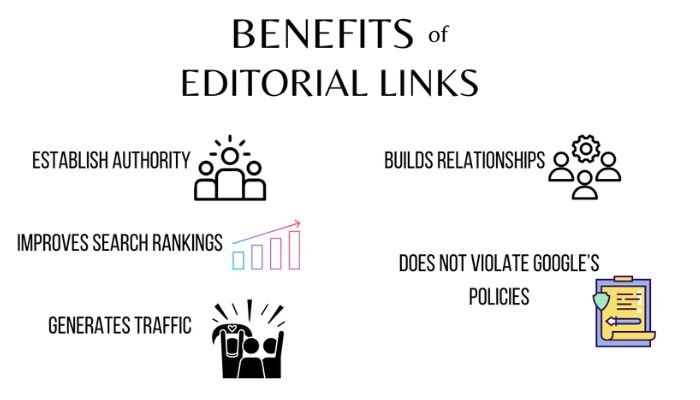When building backlinks, the best links come from people who genuinely love your content and naturally link to your web pages. Not only is this a huge compliment, but it’s also what search engines, like Google, want to see. These are called editorial links and are considered the holy grail of all backlinks.
If you’ve ever wondered if a certain kind of backlink is better than the rest, keep reading, because this article will explain why editorial links are the best and how you can get links from high authority domains.
Contents
What are editorial links?

Source
An editorial backlink is simply a link to your website created by someone who thinks your content is valuable. Most of the time, editorial links are created organically when people stumble upon your content (or are referred) while searching for information and data points to support the information they’re publishing. For example, say a personal trainer is writing an article about how to increase muscle mass and they want to include links to protein-rich recipes. They’re going to search Google, and when they find a site with good recipes, they’ll link to that website.
Search engine visibility is required to generate a flow of editorial links
Getting editorial links is only possible when you publish high-quality, authoritative content that ranks in the search engines. While some people do send links to valuable content via email, it’s usually to friends and family and not blog owners who are likely to link your content. To get noticed by authority websites in your industry, you need search engine visibility.
Why organic editorial links are ideal

The holy grail of backlinks are the ones you get organically without asking the website owner or paying a fee. There’s no outreach involved; they’re earned naturally just because your content is good.
The benefits of editorial links compared to other link building methods are:
- No effort. You don’t have to cold call, cold email, or reach out to anyone to ask for a link placement.
- No cost. Link building by creating enticing content is free. You aren’t paying anyone to publish your link and there are no advertising or marketing costs.
- No risk. When you buy bulk backlinks, you never know when your site is going to take a hit from Google. Buying links is strictly forbidden in the Webmaster Guidelines, and when Google finds out links have been purchased, sites get blacklisted, de-indexed, and links from entire websites get devalued. This means if you spend a bunch of money on links, one day they might all just disappear. Naturally acquired editorial links don’t usually get flagged as potential link spam and Google is highly unlikely to see them as a violation.
Why you want editorial links from high authority domains
Getting editorial links from a bunch of websites sounds great, but you want them to come from high authority domains as much as possible. It’s wonderful if your grandmother wants to link to your business from her personal website she created to share family photos, but that’s not going to give you much benefit.
One main purpose of getting backlinks is to get what’s been dubbed “link juice” and the more authoritative the site, the more link juice you get. This is measured in terms of PageRank. Here’s how it works in a nutshell:
Each web page in Google’s index is assigned a variety of authoritative scores that impacts ranking, one of which is called PageRank and is scored from 0-10. A higher score indicates that a web page has a large number of authoritative backlinks. Sites with higher PageRank scores tend to do better in the search engines.
To increase your PageRank, you need backlinks from sites with high PageRank scores. When a given webpage includes outbound links to external websites, it passes some of its own PageRank power onto those sites, which helps them rank better. When you acquire a backlink, the higher the PageRank score, the more link juice will be passed on to your webpage linked on that page. This will help your site get better visibility in the search engines.
When you look at the websites that have a high PageRank, they’re usually true authorities in their industry. That means if you want those authorities to find your content and naturally link to it on their websites, you need to produce top-notch, irresistible, valuable content.
However, authority sites won’t just link anything – they want to share content that provides value to their audience, and that’s why you’ll need to employ a calculated content marketing strategy.
How to attract more editorial links
Here are 5 tried-and-true methods for attracting organic editorial links.
-
Create top-notch evergreen content
Hands down, creating the most amazing, thorough, informative, educational, entertaining, or enlightening quality content is the best way to get organic editorial links. When this content is evergreen, you never have to worry about it going stale and becoming irrelevant.
Think about it from the other side. If you were looking for content to link on your site, you’d probably be a little selective regarding what you’ll link. Consider your own standards for linking to other people’s websites and apply that to the content you produce.
For example, start by making sure your entire website layout looks good, is easy to navigate, and uses colors that make visitors feel comfortable. Blue is always a good choice because it conveys a feeling of authority and professionalism.
After that, you’ll need to come up with content ideas that are new and innovative, not just rehashing the same topics everyone else has already covered. If you only publish copies of other people’s content, those pages are unlikely to rank in the vast sea of similar content. Figure out where you can bring more to the table and if there isn’t anything genuinely new in your industry, publish content that at least has a new or unique perspective on a topic. For example, start exploring segments of your industry from viewpoints other than your own. You don’t have to agree with everything, but discussing it will help you cast a wider net to reach people who are researching those other angles.
-
Collect data to make infographics
According to statistics, infographics have a 650% higher engagement rate compared to written content. This makes sense considering infographics are visual and allow visitors to take in a large amount of data at a glance. Fast is how people prefer to consume content online.
Infographics are one of the most linkable assets you could possibly create. When you publish a good infographic, if you can get it to rank, it could end up generating a lot of editorial backlinks once it gains momentum.
To make your own infographics, use Google or your favorite search engine to collect important and interesting statistics in your industry. Be sure to save the source URL so you can cite it in your infographic. Try to go as close to the original source as possible. For example, find the original study or first instance of a published statistic instead of using other blogs as your cited source. This will help you maintain a professional image and will boost your credibility when people verify your sources.
If you can’t make eye-catching infographics on your own, hire a graphic designer to do it for you. The cost of professional design is a worthwhile investment in your future backlinks.
-
Optimize your site to rank better
Once you have amazing content, whether it’s an infographic, educational articles, instructional videos, or anything else, you’ll need to implement search engine optimization (SEO) to get it to rank.
While many people perform their own SEO, it’s not easy or fast to learn. There is a steep learning curve, and unless you’re absolutely passionate about SEO, you’re probably going to get frustrated if you attempt to do it yourself.
The easiest way to get it done is to hire an SEO agency to optimize your entire site, including the content you’re using to generate organic editorial links. An SEO agency will have the right connections to get you link placements that count from high authority websites to get the ball rolling. They’ll also help you with everything else, including on-page optimization, PPC management, and they’ll even help you write whatever authoritative content you need.
-
Give your content a boost with link building
In order to start generating links naturally, your content needs to be visible in the search engines. Although getting organic, editorial links is your end goal, it helps to start building links to your content through other methods first. You have to start somewhere, and getting an initial series of backlinks will carry you a long way. For example, if you choose not to work with an SEO agency, start using content marketing, guest posting, and manual outreach to get link placements on various domains in your niche.
To get those natural editorial links, you have to start somewhere. Generating backlinks to your best content will help it rank better in the search engines so that it will eventually become visible to people who want to link to it organically.
-
Appeal to different levels
Regardless of your industry, you’ll get website visitors who are at varying levels. For example, if you run a roofing company and publish how-to advice, you’re going to get complete newbies and people who have done a lot of home repairs. Publish separate pieces of content that speak to each group to increase your chances of getting linked in the search engines. If both newbies and seasoned DIYers are your target market, you’ll get more relevant traffic. Even if your market doesn’t include newbies, the content will still help your site rank by telling Google you are a well-rounded authority in the roofing industry.
-
Aim to dominate your niche
One of your main goals should be becoming the authoritative source in your industry. You want people to read your content and immediately recognize that you know what you’re talking about and you want people to prefer your content over everyone else. This isn’t easy in saturated markets, but it’s not impossible. For instance, sometimes all it takes is writing more clearly, having a better website, and having a more aesthetically-pleasing presentation.
Need more editorial backlinks?
Editorial links will get your web pages visible in search results, which can increase traffic to your website, and increase your sales. If you need more backlinks, we’d love to create and manage your editorial backlink campaign. At Link.build, we have a proven track record of generating high-quality, authoritative editorial links for our clients using only white hat link building methods.
Reach out to us today to learn more about what we can do for your site.
- Are Nofollow Links Worth Building? - April 22, 2025
- The Benefits of Podcast Link Building - March 31, 2025
- What Is an “Organic” Backlink, Exactly? - February 28, 2025
